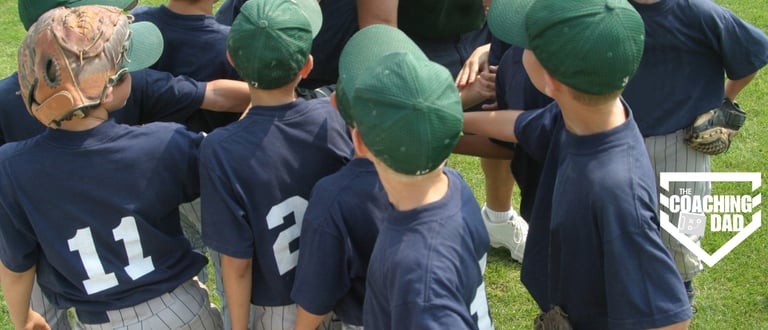Fostering Athletic Ability in Youth: A Guide for Parent Coaches
Insights on how to best support athletic growth.
3 min read
As a parent coach, you hold a unique position in the lives of young athletes. You're not just a guide in their sporting journey but also a role model, a motivator, and a crucial part of their development. Whether you have a background in coaching or not, your influence can significantly impact your child’s athletic growth and their lifelong relationship with sports. This blog aims to provide essential insights and practical tips to help you nurture the athletic abilities of young children effectively.
Understanding Youth Athletic Development
Key Facts:
Age-Appropriate Training: Children develop at different rates, both physically and mentally. It's essential to tailor your coaching to the age and developmental stage of your athletes.
Fundamentals First: Building a strong foundation in fundamental movement skills (running, jumping, throwing, catching) is crucial. These skills provide the basis for more complex sports-specific techniques.
Focus on Fun: At a young age, sports should primarily be about having fun. This encourages a lifelong interest in physical activity and reduces the risk of burnout.
Positive Reinforcement: Children respond well to positive reinforcement. Celebrate their efforts and progress, rather than just their successes, to build confidence and enjoyment.
Encouraging Growth:
Create a Supportive Environment: Ensure that your coaching atmosphere is inclusive, supportive, and encouraging. Every child should feel valued, regardless of their skill level.
Emphasize Skill Development Over Winning: While competitive spirit is important, the primary focus should be on developing skills and improving performance. This mindset helps children enjoy the process of learning and growth.
Encourage Multi-Sport Participation: Specializing in a single sport too early can lead to overuse injuries and burnout. Encourage your athletes to participate in various sports to develop a well-rounded athletic skill set.
Practical Tips for Parent Coaches
Building Physical Skills:
Warm-Up and Cool Down: Always start practices with a warm-up and end with a cool down. This helps prevent injuries and teaches children the importance of taking care of their bodies.
Drills and Games: Incorporate a mix of drills and fun games that focus on fundamental skills. For example, relay races can improve running and coordination, while games like "sharks and minnows" can enhance agility and speed.
Progression and Patience: Introduce new skills progressively. Ensure that children have mastered basic techniques before moving on to more advanced ones. Patience is key; allow them time to practice and improve at their own pace.
Mental and Emotional Development:
Set Realistic Goals: Help children set achievable, short-term goals. This can boost their confidence and provide a sense of accomplishment as they reach each milestone.
Teach Sportsmanship: Emphasize the importance of respect, teamwork, and fair play. Encourage them to cheer for their teammates and show respect to opponents, referees, and coaches.
Handle Mistakes Positively: Treat mistakes as learning opportunities. Instead of criticizing errors, discuss what can be learned and how to improve. This fosters a growth mindset.
Engaging Parents and Guardians:
Communicate Regularly: Keep parents informed about their child’s progress, practice schedules, and any upcoming events. Regular communication helps build a supportive community around your team.
Involve Them in Activities: Invite parents to participate in certain drills or games. This not only fosters a sense of community but also allows them to see the importance of their role in their child’s development.
Provide Resources: Share resources on youth sports, such as articles, videos, or workshops. Educating parents can help them better support their children's athletic and personal growth.
Challenges and How to Overcome Them
Dealing with Varied Skill Levels:
In any youth sports team, you'll encounter a wide range of skill levels. It's essential to balance the needs of advanced players with those who are still developing basic skills. One strategy is to use small group activities where children can work at their own level. You can also pair more experienced players with beginners for peer mentoring.
Managing Expectations:
Parents often have high expectations for their children, which can sometimes be unrealistic. As a coach, it's important to manage these expectations by communicating the importance of long-term development over short-term success. Remind parents that every child develops at their own pace and that the primary goal is to foster a love for the sport.
Time Management:
Balancing your responsibilities as a parent, coach, and possibly other roles can be challenging. Effective time management is crucial. Plan your practices efficiently, delegate tasks when possible, and ensure you also take time for yourself to avoid burnout.
Conclusion
Coaching your child’s sports team is a rewarding and impactful role. By focusing on creating a supportive environment, emphasizing skill development, and fostering a love for the game, you can significantly influence your young athletes' development.
Remember, your role is not just to teach sports skills but also to instill values, build confidence, and inspire a lifelong passion for physical activity. Whether you're an experienced coach or new to the role, your dedication and positive influence can make a lasting difference in the lives of these young athletes.



